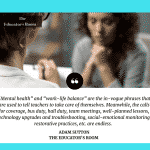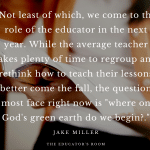In 1987, my husband and I moved back to our hometown to care for my parents. Long story short, my mom had cancer that kept showing up in different places and eventually she passed away a few weeks after scans revealed cancer had moved to her lungs. I had also returned to school to finish my degree during this time. Mom died the night before finals, so I had the experience of asking for extensions or grace for my final exams. All but one teacher allowed me to be excused from taking the tests due to my A average.
The one, demanded I still show up for the final or risk failing the semester because she had heard bogus excuses like this before. The exam was scheduled for the morning of the funeral, yet I did not want to fail, so I showed up already dressed in black. When I turned in the test to her, I stapled a copy of the obituary and funeral program to it because she needed proof.
How she treated me that day has always stuck in my head about how a teacher should NOT be with students who are grieving. At that point in my life, I did not plan on becoming a teacher. That would not come for another 14 years but when I did enter the classroom for the first time; this memory of being made to feel unworthy or less than came with me as well. I always wanted to be the teacher who gave the benefit of the doubt and second chances – especially to those trying their best just to survive outside my classroom.
Dreaded Late Work Policies
Pre-COVID, I did accept late work from my students with assigned penalties: 1st day – 11 points deduction, 2nd -21 point deduction, and 3rd – 31 point deduction as this was the district policy, and like it or not, we had to abide by it. However, I gave a million reminders of due dates whether they were posted clearly on the board, verbally, face to face, Twitter, Remind 101, emails to parents. In my mind, students had no excuse. Our district also had a policy for six-week projects that asked for them to be completed on or before the due date otherwise they were not accepted also. I am a rule follower, so I did just that. I had colleagues who no matter the excuse, chased students down all six weeks getting them to turn in missing work while their students continued to ignore them. The last week of a grading period, they had 30 or more students in their rooms before or after school completing the assignments that were weeks overdue. Teachers were exhausted.
At the time I felt it sent a message that the late work policy did not matter. During this time, I taught Pre-AP the majority of the classes, so sometimes those have a “better” work ethic- or so the myth goes with my colleagues. Yet I still held to my inner vow of being the teacher who gave the benefit of the doubt. I’ve heard my share of excuses over the years for sure. My Facebook memories even reminded me today of a status I posted lamenting about the parents that particular year begging me to magically fix their child’s grade so they could be on the A/B honor roll.
Even with all of my efforts, I still had a good chunk of my students who became lazy and expected a handout because they always have had a teacher who does this because they feel the rules are guidelines or optional. Yet as harsh as this policy may sound, I rarely had push back and had compliance. I felt I held the standard, and students mostly met the challenge, even in my General Education sections did. Some began to see the benefit of turning work in on time. However, if your assignment was late, I always had a conversation with those students to see what was going on. I would ask questions such as: Did you not understand the assignment? Were you scared to start because it had to be just right? Is something going on outside of school I can help with?
I also called or emailed parents to get their side of what was happening with their child. If I heard stories of an unexpected crisis that kept them from completing an assignment, I did not deduct those points. If their parent said the child had played video games instead of doing their homework, I deducted the points. This is where I tried to be reasonable and show compassion, unlike my college professor.
Exceptions to the Rules
For those students going through a tough situation like a death in the family, medical emergencies, a fire destroying their home, divorce, moving, or homelessness, I tried to work with the family to help that child be successful. Many of my students with extenuating circumstances were given the opportunity to come to my classroom before school, homeroom, or after school. A few gave up their lunch (meaning I gave up mine as well) to do the work. They put in the effort to do their best and that’s all I asked. For a few, this arrangement became their new normal for the year. One little girl last fall stayed with me every Thursday during her lunch to catch up on assignments because, after the death of her mom the previous Spring, she had to be in charge of the younger siblings in completing their assignments. For all of the students who came in during these times, I did not take the points off either even though they insisted I did to be fair. I always told them, the story of my college professor, and how I wanted to be different. For some of my students, grades did matter to them, but the relationship with them mattered more.
Late work and COVID
So what changed? COVID-19 came into the picture. Last Spring when we all went remote nationwide, our district asked us to be lenient on accepting late work. I still hounded my students with emails, texts, and phone calls. There were a few dealing with the virus first hand, but a few were playing Animal Crossing instead of doing the assigned work, which at the time we paired down assignments into bite-size chunks. I took pity on those who had parents working outside the home still while they had to manage siblings completing their assignments on top of their own.
My “classroom hours” went beyond the norm as I met with a few late into the evening hours when they finally had a chance to finish their own work. I’m sure this is the story of many of us even today. I bring this up because on one of the teacher forums I am part of, the question about accepting late work during the pandemic came up. This year is unlike other years. I imagine if I were in the classroom this year, I’d waive my late work policy, but I’d still be on top of students like I was in the Spring.
Whether it’s a season or a year, districts need to first trust teachers. I probably would accept the late work this year, but here’s the downside. It’s that extra work and time we do not have. Teachers are already on the edge of burnout or just completely burned out and a shell of their former selves. So maybe districts should extend the deadline for us on when grades are due? Teachers need to give themselves grace and decide exactly what they will accept late. I’ve always heard from other veteran teachers “not everything has to be graded.” So maybe that is still a valid argument for today.
What is our End of the Year Goal?
During this year of uncertainty, what is the end of the year goal for our students? Is it for them to score well on standardized tests? Or is it to learn the grade-level standards for that year with some amount of mastery?
We all know students may be taught a particular strand in their grade level, but that does not mean they learn it. Some skills are difficult or quickly taught before it becomes sticky in their brain. So, students will come to us with gaps. In 7th grade, you’d think every student would know what a conjunction was or the purpose of one right? Or even how to capitalize the pronoun, I? This is taught in 3rd grade in our state, so I’m sure it’s not much different from others. It just means for me, when there are a handful of students sitting there clueless on these basic skills, I just need to reinforce and reteach. We are at a point in the academic history of our students that we need to accept that next year and the future years, there might be some reteaching going on to fill in those gaps created in 2020.
With all of this, teachers must decide what late work you are willing to accept. Maybe the work that truly measures a skill you want to be sure they have acquired. Take advantage of formative assessments through conferences and such without assigning “tests” all the time. When grading these assignments, or any assignments, use a teacher-friendly rubric and only assess what is on the rubric. As an English teacher, I have to force myself to grade this way because I want to mark EVERYTHING or fix EVERYTHING which takes up precious time I do not have.
Final Thought
This year should force schools across the nation to rethink policies around late work that they hold near and dear to their hearts because students are not the only ones missing from our classes this year. We have teachers also missing due to quarantine or even worse – death. Missing teachers still have to assess the learning of their students right? I do hope districts are not out there requiring a teacher in a hospital bed to grade student’s work. The times have changed, so we need to change with them and it starts with extending grace to all concerned.







